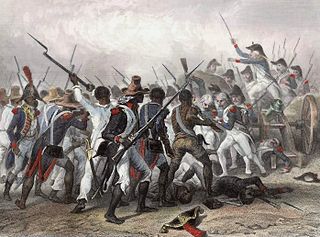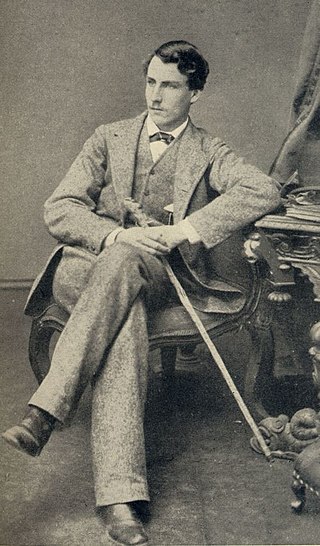
The Dean Cemetery is a historically important Victorian cemetery north of the Dean Village, west of Edinburgh city centre, in Scotland. It lies between Queensferry Road and the Water of Leith, bounded on its east side by Dean Path and on its west by the Dean Gallery. A 20th-century extension lies detached from the main cemetery to the north of Ravelston Terrace. The main cemetery is accessible through the main gate on its east side, through a "grace and favour" access door from the grounds of Dean Gallery and from Ravelston Terrace. The modern extension is only accessible at the junction of Dean Path and Queensferry Road.

The Baptist War, also known as the Sam Sharp Rebellion, the Christmas Rebellion, the Christmas Uprising and the Great Jamaican Slave Revolt of 1831–32, was an eleven-day rebellion that started on 25 December 1831 and involved up to 60,000 of the 300,000 slaves in the Colony of Jamaica. The uprising was led by a black Baptist deacon, Samuel Sharpe, and waged largely by his followers. The revolt, though militarily unsuccessful, played a major part in the abolition of slavery throughout the British Empire.

The Morant Bay Rebellion began with a protest march to the courthouse by hundreds of people led by preacher Paul Bogle in Morant Bay, Jamaica. Some were armed with sticks and stones. After seven men were shot and killed by the volunteer militia, the protesters attacked and burned the courthouse and nearby buildings. Twenty-five people died. Over the next two days, poor freedmen rose in rebellion across most of St. Thomas-in-the-East parish.

Thomas William Hazen Rolleston was an Irish writer, literary figure and translator, known as a poet but publishing over a wide range of literary and political topics. He lived at various times in Killiney in County Dublin, Germany, London and County Wicklow; settling finally in 1908 in Hampstead, London, where he died. His Killiney home, called Secrora, subsequently became the home of tennis player Joshua Pim.
Jamaican literature is internationally renowned, with the island of Jamaica being the home or birthplace of many important authors. One of the most distinctive aspects of Jamaican literature is its use of the local dialect — a variation of English, the country's official language. Known to Jamaicans as "patois", and now sometimes described as "nation language", this creole has become an important element in Jamaican fiction, poetry and theater.

The White Witch is a legendary story of a haunting in Jamaica. According to the legend, the spirit of "Annie Palmer" haunts the grounds of Rose Hall, Montego Bay.
Thomas MacDermot was a Jamaican poet, novelist, and editor, editing the Jamaica Times for more than 20 years. He was "probably the first Jamaican writer to assert the claim of the West Indies to a distinctive place within English-speaking culture". He also published under the pseudonym Tom Redcam. He was Jamaica's first Poet Laureate.
The history of the Jews in Jamaica predominantly dates back to migrants from Spain and Portugal. Starting in 1309, many Jews began fleeing from Spain because of the persecution of the Holy Inquisition. When the English captured Jamaica from Spain in 1655, the Jews who were living as conversos began to practice Judaism openly. By 1611, the Island of Jamaica had reached an estimated population of 1,500 people. An estimated 75 of those people were described as "foreigners," which may have included some Portuguese Jews. Still, many Jews faced persecution from English merchants.
Herbert George de Lisser CMG was a Jamaican journalist and author. He has been called "one of the most conspicuous figures in the history of West Indian literature".
The Auditor of the Literary and Historical Society at University College Dublin, Ireland is a position elected by the members of the society. In this setting, the term auditor has no connection with accounting but means "a position corresponding to that of President of the Union at Oxford or Cambridge". Some former auditors of the society have gone on to careers of high distinction in law, politics, medicine, academia, journalism, and other endeavours.
The High Sheriff of Kerry was the British Crown's judicial representative in County Kerry, Ireland from the 16th century until 1922, when the office was abolished in the new Free State and replaced by the office of Kerry County Sheriff. The sheriff had judicial, electoral, ceremonial and administrative functions and executed High Court Writs. In 1908, an Order in Council made the Lord-Lieutenant the Sovereign's prime representative in a county and reduced the High Sheriff's precedence. However, the sheriff retained his responsibilities for the preservation of law and order in the county. The usual procedure for appointing the sheriff from 1660 onwards was that three persons were nominated at the beginning of each year from the county and the Lord Lieutenant then appointed his choice as High Sheriff for the remainder of the year. Often the other nominees were appointed as under-sheriffs. Sometimes a sheriff did not fulfil his entire term through death or other event and another sheriff was then appointed for the remainder of the year. The dates given hereunder are the dates of appointment. All addresses are in County Kerry unless stated otherwise.
Ernest M. Cupidon was a Jamaican comedian and actor. He performed in an adaptation of Herbert George de Lisser's novel Susan Proudleigh and was known for his use of dialects and patois. He is credited by being the first actor to bring Caribbean dialect performance to Jamaican theatre and has been referred to as a "central figure" in the country's dramatic history during this era. Cupidon was active in the 1930s Jamaican entertainment industry.
Collegiate School was a secondary school for boys that operated from 1853 until 1902 in Kingston, Jamaica. Herbert George de Lisser went to the school while it was headed by William Morrison. Andrew J. Milne was also a headmaster at the school. Laurence R. Fyfe went to Collegiate.
Lucille d'Oyen Iremonger, née Parks, was a Jamaican writer and politician, active in the United Kingdom.
Jamaica Dockyard also known as Port Royal Dockyard was a British Royal Navy Dockyard located at Port Royal, Jamaica. It was established 1675 and closed in 1905. The dockyard was initially administered by the Navy Board then later the Board of Admiralty.




